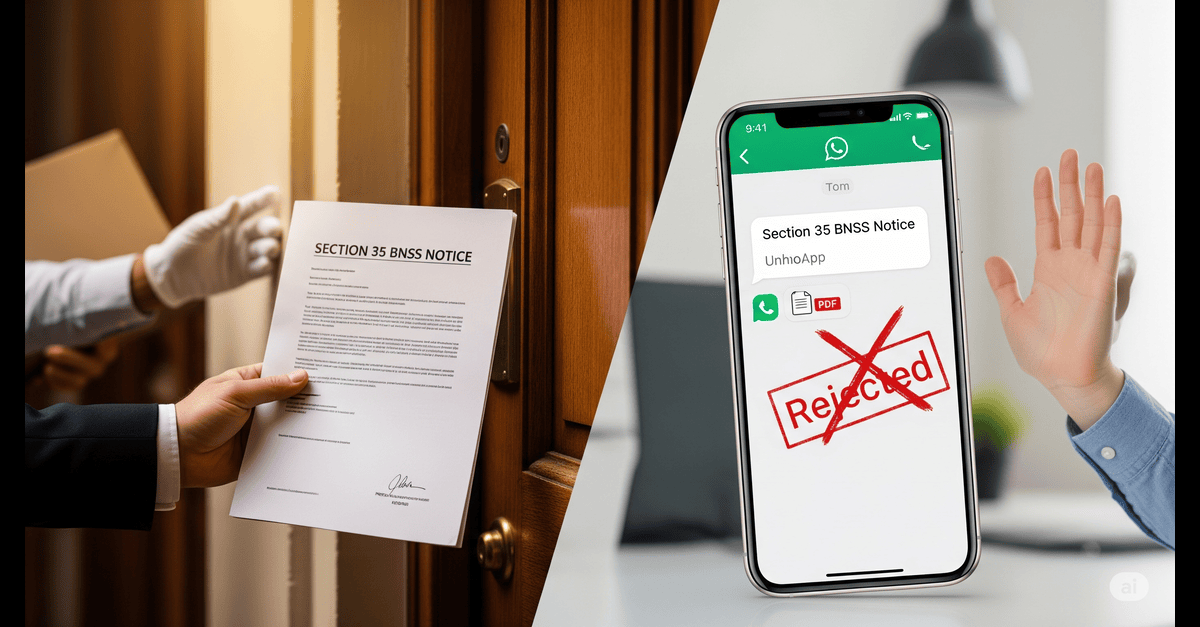Case Name: Satinder Kumar Antil v. Central Bureau of Investigation and Anr.
Case Number: In 2025 IA No. 63691 of 2022 in MA No. 2034 and in 2021 in MA No. 1849 also in SLP (Crl. No. 5191 of 2021.
Judgment Date: July 16th 2025.
Bench: Hon’ble Judges M.M. Sundresh and Nongmeikapam Kotiswar Singh.
Introduction:
This issue came up out of a petition put forth by the State of Haryana which sought to have clarified and amended a Supreme Court’s earlier order of 21 January 2025 which had held that notices under the Bharatiya Nagarik Suraksha Sanhita, 2023 (BNSS)’ Section 35 do not extend to electronic service. The State presented that modern communication methods like WhatsApp or email should be accepted as valid for service of such notices which they put forth is for efficiency and also in alignment with digital governance. However the Amicus Curiae which brought the other side of the argument brought to notice the issues of personal liberty which would play out with regard to these electronic notices and also brought up that there is no legislative which sanctions electronic service under Section 35.
Issues for Determination:
- Whether under Section 35 of the BNSS, 2023 notices may be served via electronic means.
Legal Provisions Involved:
Section 4, 8, 10, 12, 32, 130 of the Bharatiya Nagarik Suraksha Sanhita, 2023.
Article 21 of the Indian Constitution.
Appellant’s (State of Haryana’s) Arguments:
The State put forth that under Sections 64 and 71 of the BNSS electronic communication is what we use for service of summons. Also it is of the view that the aim of Section 35 is to inform the accused and to give them a chance to present themselves for investigation before any action is taken which is coercive. Thus notice via WhatsApp or any other digital medium is enough. Also the State referred to Section 530 of the BNSS which in fact promotes the use of electronic processes when they are available to make criminal procedure more efficient.
Respondent’s (Amicus Curiae’s) Arguments:
The Amicus Curiae presented against the application which also put forth that a notice under Section 35 may lead to an arrest if not complied with hence it is a direct issue of personal liberty. Also the Amicus reported that the legislature did not include electronic service for Section 35 in the Code as they did for other sections like 64, 71 and 94 which do have electronic service mentioned. Thus notices for Section 35 must be personal and introduction of electronic service in this case would break procedural fairness and also go against Article 21.
Court’s Analysis:
The Court drew out the difference between a summons and a notice as provided in Section 35. It is that a summon is issued by the court for appearance in a judicial proceeding, but a Section 5 notice is put out by the police during the investigatory stage which may in fact lead to an arrest. From this point of issue of which has large scale impact on liberty the Court said the protections had to be of a higher order. Also the Court reported that in Sections 64, 71, 94, and 193 of the BNSS which they looked at there was explicit provision for electronic service where that was the intent. In the case of Section 35 which does not have that language the Court saw that as a reflection of legislative intent to not include electronic service in issues which may result in an arrest. Also Section 530 which we see as a promotion of electronic communication specifically excepts out of its application the investigative stage which also the Court took note of.
Judgment:
The Court turned down the State of Haryana’s petition (IA No. 63691 of 2025) and brought forward it’s previous ruling of the 21st of January 2025. It also put forth that under Section 35 of BNSS 2023 notice has to be served personally and not by electronic means which is so due to the very serious results that may come out of non compliance with said notices.
Conclusion:
The Supreme Court stressed the issue of procedural safeguards in personal liberty cases. Though digital communication may improve in other aspects of criminal procedure, it does not do away with personal service when it comes to an individual’s liberty. The Court’s judgment sees to it that investigative actions as per Section 35 of the BNSS are in agreement with the constitution which in turn includes Article 21.
PRIME LEGAL is a full-service law firm that has won a National Award and has over 20 years of experience in various sectors and practice areas. Prime Legal falls into the category of best law firm, best lawyer, best family lawyer, best divorce lawyer, best criminal lawyer, best criminal law firm, best consumer lawyer, best civil lawyer.”
WRITTEN BY AYUSHI TRIVEDI


